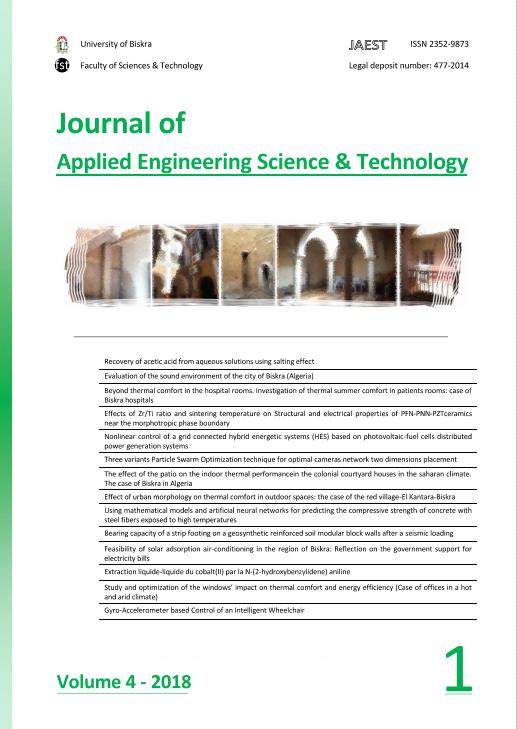Recovery of acetic acid from aqueous solutions using salting effect
Abstract
The application of salting effect to isolate an organic acid, particularly Acetic acid, from aqueous solution is reported. In fact the presence of a salt can influence the solubility of a compound by either increasing it or decreasing it, leading to Salting-in and Salting-out, respectively. The addition of a salt in an aqueous solution introduces ionic forces which affect liquid-liquid equilibrium and which influence directly the distribution coefficient of the solute. The effect of NaCl and Na2SO4 on the liquid-liquid equilibrium data of the ternary system (Water+ Acetic Acid+ Dichloromethane) at a temperature of 293.15 K and an atmospheric pressure is studied experimentally in this work. The mass fractions of salt in the total mixture are 5%, 10% and 20%. It is noted that the equilibrium between phases is modified preferably to the extracted phase and the salting-out in the case of sodium sulfate is more significant than the effect of chloride.
J. Appl. Eng. Sci. Technol. (JAEST - ISSN 2352-9873) is a peer-reviewed quarterly journal dedicated to the applied engineering sciences and technology. The JAEST provides immediate open access to its content on the principle that making research freely available to the public supports a greater global exchange of knowledge.
There is no submission or publication fee for papers published in the JAEST.
Authors who publish in the JAEST agree to the following terms:
- Authors retain copyright and grant the journal right of first publication with the work simultaneously licensed under a Creative Commons Attribution License that allows others to share the work with an acknowledgement of the work's authorship and initial publication in the JAEST.
- Authors are able to enter into separate, additional contractual arrangements for the non-exclusive distribution of the journal's published version of the work (e.g., post it to an institutional repository or publish it in a book), with an acknowledgement of its initial publication in the JAEST.
- Authors are permitted to post their work online (e.g., in institutional repositories or on their website) prior to and during the submission process, as it can lead to productive exchanges, as well as earlier and greater citation of published work (See The Effect of Open Access). Any such posting made before acceptance and publication of the Work shall be updated upon publication to include a reference to the JAEST and a link to the online abstract for the final published Work in the Journal.






